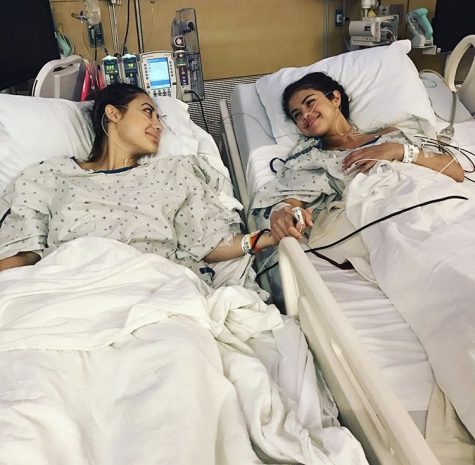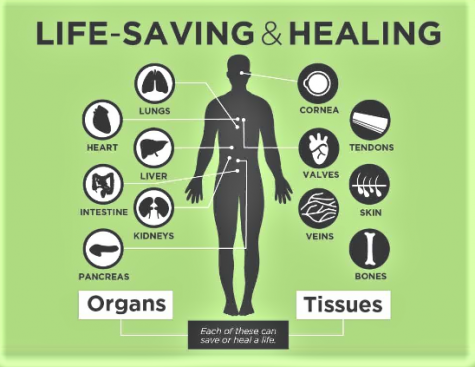Yes or no: What it means to be an organ donor
You’re sixteen and sitting at the DMV, panicking about your upcoming driver’s exam. They call your name, you take the test, and you pass!
You get your picture taken, but before she hands you your license, the lady behind the counter asks you a question you’re not quite ready for: “Would you like to be an organ donor?”
What?
Although extremely important, many Americans have little to no knowledge of what it really means to be an organ donor, and how it can affect the lives of so many other Americans.
So, what is organ donation?

First, it’s important to know that two types of donation take place: living and deceased. While still living, one can donate a single kidney, a single lung or a part of a lung, and a part of the pancreas and the liver, if he or she desires. Recently, world renowned singer Selena Gomez received a kidney from her best friend, actress Francia Raisa. Gomez announced this past September that she suffered from Lupus, a disease that causes the immune system to attack one’s vital organs, and that Raisa was a match to donate a kidney to Gomez. Gomez received the transplant over the summer and is now thriving.
Deceased donation occurs much more often than living, but deceased donation is actually quite rare. According to Jennifer Hudak-Million, Donate Life Ohio’s Community Education Supervisor, only about one percent of registered donors are actually able to donate. If a donor dies on a ventilator in a hospital from brain death, a disease or illness that attacks the brain but not the rest of the body, he or she is able to donate organs.
Organs that can be recovered include lungs, the heart, kidneys, the liver, the pancreas, and the small intestine. Corneas of the eyes can also be donated, and this is the most common transplant. One donor’s organs and corneas can save up to eight lives.
Since doctors have such a limited amount of time to recover organs and transport them to the recipient, those who pass away from other illnesses or accidents, also known as cardio death, are not able to donate organs. Donors who pass away from cardio death, however, are able to donate tissue, including tendons, bone, cartilage, and skin, along with other forms of tissue. One donor’s tissue can save up to 50 lives.

According to Donate Life Ohio, advanced medical technology has come a long way in terms of success, and transplants are now considered a legitimate treatment option instead of an experimental one, when organs are available.
One person is added to the transplant list every ten minutes. Currently, there are 115,873 Americans in need of organs in the United States. And because of the shortage of organs and donors, about twenty people die each day in need of a lifesaving transplant.
“Sometimes, people make their decision based on what they hear in the media without knowing the facts,” said Hudak-Million. Many myths have circulated pertaining to donation. For instance, some people believe that once a doctor knows his patient is a registered donor, he will not try as hard to save his patient’s life. This is false, because if this were to happen, the doctor would lose his medical license for not using his abilities to save the patient. Donation has no influence on doctors or patients until the patient passes away.

Another common reason why many do not choose to donate is because they think that donation is against their religion. However, according to Donate Life Ohio, “All major religions in the United States support organ, eye and tissue donation and consider it a generous act of caring.” Also, organ donors are able to have open casket funerals.
No one is too old or too young to donate. Donate Life Ohio said that their oldest cornea donor, for example, was 107 years old.
Senior Maddie McMillen is a registered organ donor. “I think being an organ donor is a great way to give back and help others,” she said.
When making a decision, think of those in need of organs. Think of their families. Think of a grandmother who wants to watch her granddaughter grow up, graduate high school, and get married, but her health gets in the way. She taught her granddaughter how to wrap presents, bake incredible cookies, and be a thrifty shopper. Think of this grandmother passing away while on the transplant list, waiting for a lung. Think of how this affected me, and how much more she could’ve taught me if she had received the precious gift of a lung.